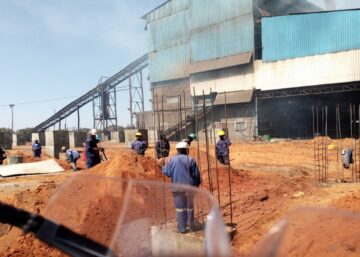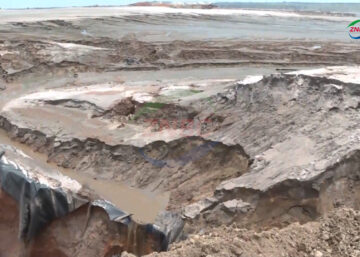Status: OPEN
Last updates
- Mar 2025: Human Rights Watch accuses Zambia’s government of not intervening against environmental law “blatant violations” and failing to protect Kabwe’s citizens from continued exposure to lead poisoning
- 2023: South African courts dismissed Kabwe’s lawsuit against Anglo American over lead poisoning
- 2021: the Alliance for a Lead-Free Kabwe was formed to advocate for a comprehensive and robust remediation plan
- July 2021: UN special rapporteurs urged the Zambian government to remove the toxic waste in Kabwe and address the health and pollution risks.
- October 2020: law firms representing 140,000 women and children from Kabwe filed a class-action lawsuit against Anglo American. The company denied any responsibility for lead poisoning.
Concerns
- Health risk: lead poisoning from former mining operations affected half of Kabwe’s population; 95% of children in townships exposed to lead have elevated blood-lead levels
- Soil Pollution
- Ongoing exposure to toxic waste, partly due to artisanal mining and the reprocessing facility
- Mismanagement and negligence in the government’s response programme
- No plan to clean up the toxic waste
- Anglo American not held responsible for the consequences of mining operations
Context
The world’s most toxic city
For much of the 20th century (1906–1994), the city of Kabwe was home to one of Africa’s most significant lead mining and smelting operations. This industry played a crucial role in driving Zambia’s economy and provided employment for thousands of residents. At its peak, between 1925 and 1974, the mine—operated by a subsidiary of Anglo American—was the continent’s largest producer of lead. However, following nationalization and declining global demand, production was gradually scaled down, and the mine ultimately closed in 1994.
Yet the site’s toxic legacy endures. An estimated 5 to 6.5 million tons of hazardous waste remain on the outskirts of Kabwe, forming what is commonly known as the “Black Mountain.” A facility exists to reprocess some of this waste, further contributing to ongoing pollution, and informal artisanal mining continues—posing significant health risks to residents who rely on it for their livelihoods.
For over a century, thousands of residents, mine workers, and community members have been exposed to dangerous levels of lead. Blood tests consistently reveal widespread lead poisoning. Studies estimate that over 100,000 people—possibly as many as 140,000, about half the city’s population—are affected. Children are particularly vulnerable: lead exposure at a young age can severely impair brain development, hindering learning, memory, and concentration. Teachers and parents frequently report such symptoms in schools throughout Kabwe. A 2017 study found that 95% of children living in affected townships had blood-lead levels high enough to warrant hospitalization[1].
The consequences of lead exposure are devastating. It can cause irreversible brain damage, infertility, and even death. Alarm bells were already being sounded in the 1970s, when doctors noted abnormally high rates of child mortality in areas near the mine—yet these warnings went largely unheeded.
As a result of this prolonged and unaddressed crisis, Kabwe has earned grim epithets such as “the world’s most toxic city,” and the “world’s most notorious sacrifice zone”—a place where people bear the burden of environmental destruction they did not create.
Unfortunately, no straightforward solution has been put in place. Public resources remain scarce, limiting the government’s ability to address the crisis effectively. In 2016, with financial support from the World Bank, the government launched a programme aimed at providing testing and treatment for affected individuals, relocating vulnerable residents, and cleaning up a contaminated canal. However, the initiative was marred by allegations of mismanagement and negligence. Implementation was slow, and treatment services often failed to reach those most in need.
Crucially, the programme—which concluded in 2024—did not tackle the core issue: the massive volumes of lead waste still present in densely populated areas of Kabwe. As a result, new cases of lead poisoning continue to emerge, even three decades after the mine’s closure.

Fighting for justice
Faced with continued inaction, community members in Kabwe have taken matters into their own hands to demand justice. In October 2020, a group of concerned citizens filed a landmark class-action lawsuit against Anglo American on behalf of 140,000 women and children affected by lead poisoning. The case, one of the largest of its kind ever brought in Africa, alleged negligence on the part of the company for failing to prevent widespread contamination during its ownership of the mine (1925-1974).
While Anglo American acknowledged the seriousness of the situation in Kabwe, it denied any legal responsibility. The company argued that it had not operated the mine directly and that it cannot be held accountable decades later for actions taken under different legal and scientific standards.
Despite support from leading international human rights lawyers, Amnesty International, and UN Special Rapporteurs, the Johannesburg High Court echoed this view in its 2023 ruling and dismissed the case in December 2023.
“The applicants seek permission to advance an untenable claim that would set a grave precedent. The precedent is that a business could be held liable half a century after its activities have ceased, to generations not yet born, as a result of being tested against future knowledge and standards unknown at the time.”
In response to the ruling, the legal team representing the women and children of Kabwe has announced its intention to appeal the judgment, on the following grounds:
- Anglo American held a controlling interest and was effectively in charge during the most productive (and polluting) years of the mine. Records show that two-thirds of the mining at the Broken Hill Mine occurred under Anglo American’s majority ownership.
- By the mid-20th century, there was already scientific awareness of lead’s toxic effects—especially on children. There is evidence that some medical professionals in Kabwe were raising red flags as early as the 1970s.
To amplify local voices and push for meaningful redress, in 2021 a coalition of civil society organizations formed the Alliance for a Lead-Free Kabwe, of which TI-Z is a member. The Alliance advocates for a comprehensive and accountable response to the crisis—one that includes fair compensation for affected individuals, access to testing and treatment, and, most critically, the removal of lead waste from the area.
In 2023, the Alliance achieved a significant milestone: a formal engagement with President Hakainde Hichilema, which led to the formation of an interministerial committee tasked with overseeing a remediation plan. However, two years later, tangible progress remains limited. In light of what it describes as a “blatant violation” of environmental laws and the continued exposure of residents to toxic lead, Human Rights Watch has called on the Zambian government to urgently intensify its efforts.
Waving the Red Flag
The Kabwe lead poisoning case underscores a number of deeply troubling realities and systemic failures that Zambia must urgently confront:
- Severe health and environmental toll on Kabwe residents—especially children. As detailed above, the effects of lead poisoning can be devastating and, in some cases, fatal. In Kabwe, the number of affected individuals is estimated in the hundreds of thousands. Lead poisoning has also led to soil deterioration with a negative impact on agriculture.
- Government inaction and administrative failures. In the face of such a severe public health emergency, government intervention has been limited at best. The World Bank–funded programme initiated in 2016 to provide testing, treatment, and environmental remediation was hampered by allegations of mismanagement and negligence. According to local residents, access to treatment has been virtually non-existent since 2021.
- Neglect of the root cause: hazardous waste. Any attempt to reduce lead exposure in Kabwe must begin with addressing the over 6 million tons of toxic waste still present in the area. Remediation efforts to date have failed to reduce children’s exposure, as contaminated soil and dust remain in and around residential communities. Mining operations—both artisanal and industrial, including South African, Chinese, and Zambian companies—continue to operate, sustaining dangerous pollution levels. To date, no comprehensive plan has been developed or implemented to remove the waste.
- Lack of accountability for Anglo American. The 2023 ruling by the Johannesburg High Court, which dismissed the class-action lawsuit brought against the company, represents a major missed opportunity for corporate accountability. The judgment reinforced a long-standing dynamic in which multinational corporations extract value with impunity while local communities bear the long-term consequences. Rather than setting a precedent for justice, the ruling echoes the exploitative patterns of neocolonialism, leaving the affected population without recourse.
Figure 1: the lead smelting facility in Kabwe (Source: Al Jazeera)
Figure 2: Trucks at the ‘Black Mountain’, the concession of Enviro Processing Limited that holds much of Kabwe’s mine lead waste in Kabwe, Zambia [Trajectory Media/HRW via Al Jazeera]
Footnotes:
[1] Bose-O’Reilly S, Yabe J, Makumba J, Schutzmeier P, Ericson B, Caravanos J. Lead intoxicated children in Kabwe, Zambia. Environ Res. 2018 Aug;165:420-424. doi: 10.1016/j.envres.2017.10.024. Epub 2017 Oct 28. PMID: 29089102.
Sources:
- https://www.hrw.org/report/2025/03/05/poisonous-profit/lead-waste-mining-and-childrens-right-healthy-environment-kabwe
- Lead intoxicated children in Kabwe, Zambia – PubMed
- Zambia: Government Stalling on Lead Cleanup Plan | Human Rights Watch
- Zambia government’s neglect exposing more children to lead poison, HRW says | Environment News | Al Jazeera
- Judge throws out Kabwe lead-poisoning case against Anglo American mining | Global development | The Guardian
- Our position on the Kabwe legal claim | Anglo American
- This spot on earth is the most polluted due to toxic mines : Goats and Soda : NPR
- Zambia must treat children suffering from lead poisoning, clean up former mine area – UN experts | OHCHR
- Zambia: CSOs says government is delaying urgently needed action to clean up severe lead contamination in the city of Kabwe – Business & Human Rights Resource Centre
- subm-access-justice-effective-cso-hr-watch.docx








